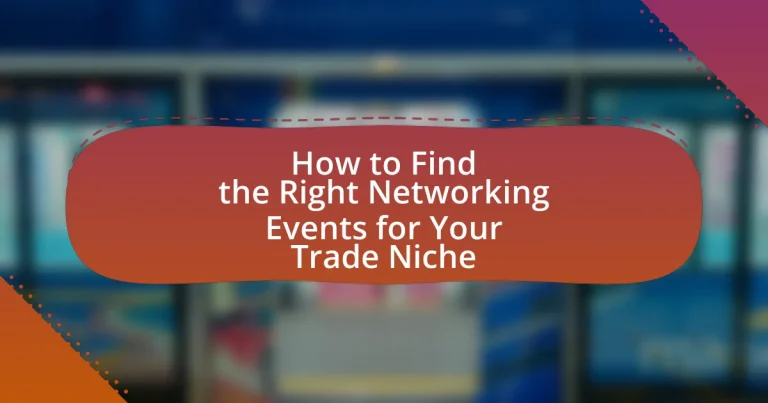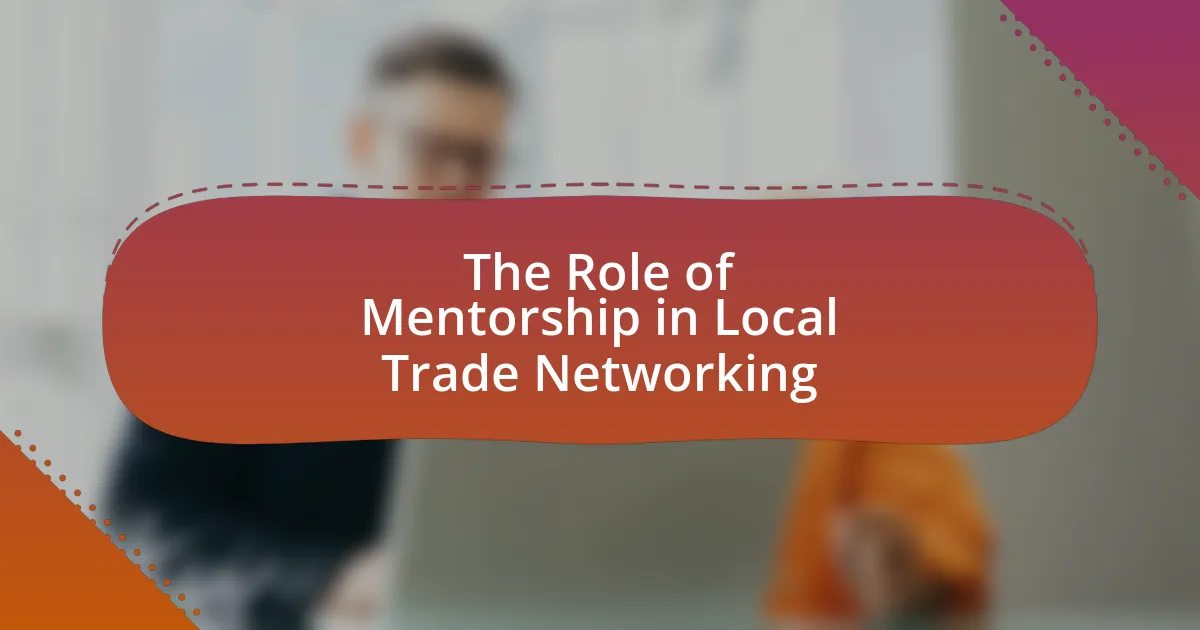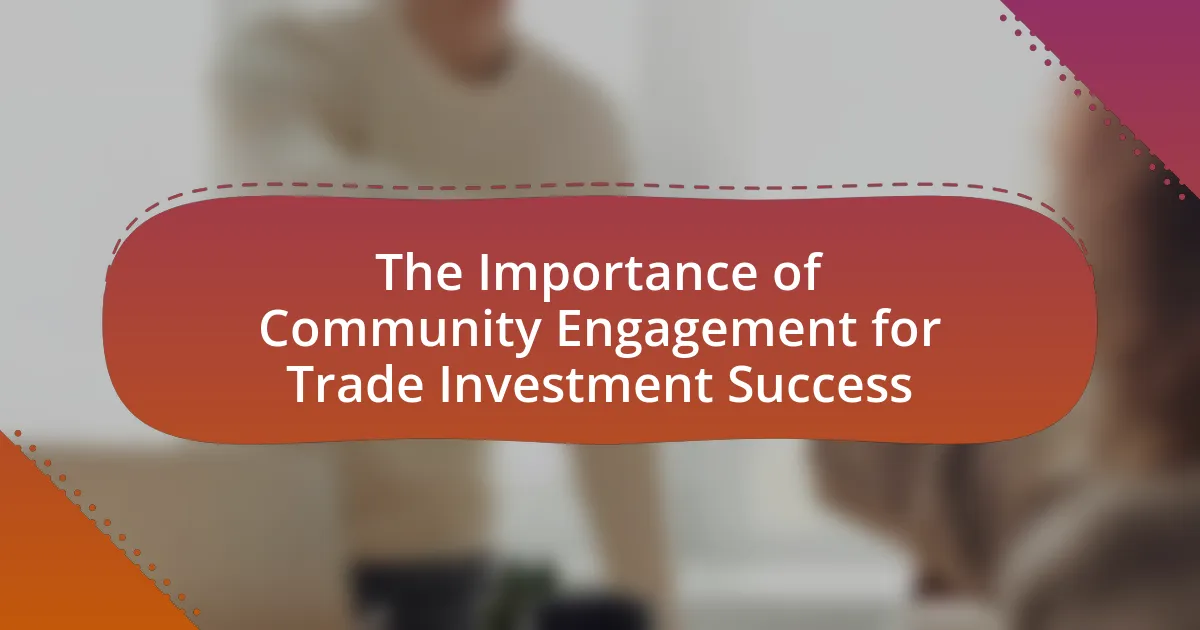Networking events are organized gatherings that enable professionals within specific industries to connect, share knowledge, and build relationships, playing a vital role in career advancement and business growth. The article outlines the importance of these events for trade niches, detailing how they facilitate collaboration, provide industry insights, and enhance visibility. It discusses various types of networking events, strategies for identifying the right ones, and best practices for maximizing the networking experience, including preparation, follow-up actions, and maintaining connections. Additionally, it highlights the differences between online and in-person events, emphasizing the significance of location and targeted research in selecting the most beneficial opportunities for professional development.
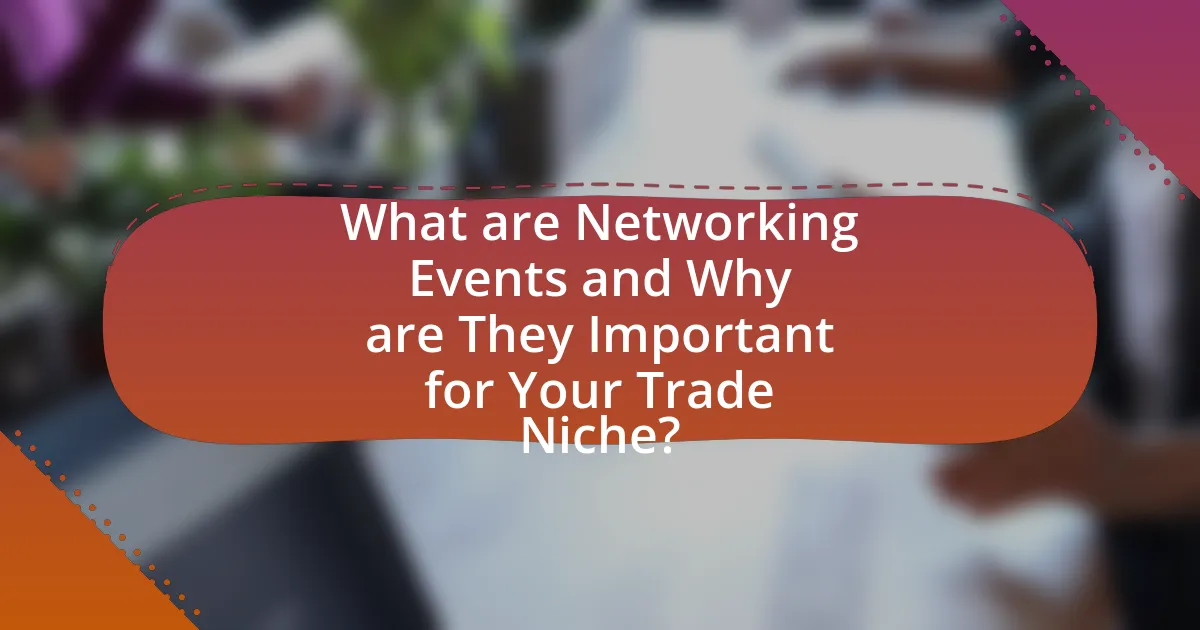
What are Networking Events and Why are They Important for Your Trade Niche?
Networking events are organized gatherings where professionals from specific industries come together to connect, share knowledge, and build relationships. These events are crucial for trade niches as they facilitate collaboration, foster partnerships, and provide opportunities for learning about industry trends and best practices. According to a study by the Harvard Business Review, 70% of jobs are found through networking, highlighting the importance of these events in career advancement and business growth. Networking events also allow participants to exchange ideas and resources, which can lead to innovative solutions and increased visibility within their trade niche.
How do Networking Events Benefit Professionals in Specific Trades?
Networking events benefit professionals in specific trades by providing opportunities for relationship building, knowledge sharing, and career advancement. These events allow professionals to connect with peers, industry leaders, and potential clients, fostering collaborations that can lead to job opportunities or partnerships. For instance, a study by the Harvard Business Review found that 70% of jobs are found through networking, highlighting the importance of these events in career progression. Additionally, networking events often feature workshops and discussions that enhance industry knowledge, keeping professionals updated on trends and best practices. This combination of relationship building and knowledge acquisition makes networking events essential for professionals in various trades.
What Opportunities Do Networking Events Provide for Trade Professionals?
Networking events provide trade professionals with opportunities to establish valuable connections, gain industry insights, and enhance their visibility. These events facilitate direct interactions with peers, potential clients, and industry leaders, allowing professionals to exchange knowledge and explore collaboration possibilities. According to a survey by LinkedIn, 85% of jobs are filled through networking, highlighting the importance of these events in career advancement. Additionally, networking events often feature workshops and panels that offer the latest trends and best practices, further enriching the professional development of attendees.
How Can Networking Events Enhance Your Career Growth?
Networking events can significantly enhance your career growth by providing opportunities for professional connections, knowledge sharing, and visibility in your industry. These events allow individuals to meet potential employers, mentors, and peers, facilitating relationships that can lead to job opportunities and collaborations. According to a LinkedIn survey, 85% of jobs are filled through networking, highlighting the importance of building a professional network. Additionally, attending industry-specific events can keep you informed about trends and innovations, further positioning you as a knowledgeable candidate in your field.
What Types of Networking Events Exist for Different Trade Niches?
Various types of networking events exist for different trade niches, including industry conferences, trade shows, workshops, seminars, and meetups. Industry conferences gather professionals from specific sectors to share knowledge and foster connections, while trade shows allow businesses to showcase products and services to potential clients and partners. Workshops provide hands-on learning experiences, enhancing skills relevant to particular trades. Seminars often feature expert speakers discussing trends and innovations, facilitating networking among attendees. Meetups are informal gatherings that encourage local professionals to connect and collaborate. Each event type serves distinct purposes tailored to the needs of specific trade niches, promoting relationship-building and knowledge exchange.
What are the Key Characteristics of Industry-Specific Networking Events?
Industry-specific networking events are characterized by their focus on a particular sector, facilitating targeted connections among professionals within that field. These events typically feature specialized content, such as workshops, panels, and discussions led by industry experts, which provide attendees with relevant insights and knowledge. Additionally, they often include opportunities for direct interaction, such as structured networking sessions or informal meet-and-greets, allowing participants to build relationships with peers and potential collaborators. The presence of industry-relevant exhibitors and sponsors further enhances the experience by showcasing products and services tailored to the specific trade. Overall, these characteristics create an environment conducive to meaningful exchanges and professional growth within the industry.
How Do Online Networking Events Compare to In-Person Events?
Online networking events offer greater accessibility and convenience compared to in-person events. Participants can join from anywhere, eliminating travel costs and time, which can lead to a broader and more diverse audience. In contrast, in-person events facilitate stronger personal connections through face-to-face interactions, which can enhance relationship-building and trust. A study by the Event Marketing Institute found that 84% of participants believe in-person events foster stronger relationships than virtual ones. Thus, while online events excel in reach and flexibility, in-person events are superior for building deeper connections.

How Can You Identify the Right Networking Events for Your Trade Niche?
To identify the right networking events for your trade niche, start by researching industry-specific organizations and associations that host events relevant to your field. These organizations often provide calendars of upcoming events, including conferences, trade shows, and seminars tailored to specific industries. For example, the National Association of Manufacturers frequently organizes events that cater to manufacturing professionals, ensuring that attendees connect with peers and industry leaders. Additionally, utilize social media platforms like LinkedIn to join groups related to your niche, where members often share information about relevant networking opportunities. This targeted approach increases the likelihood of attending events that align with your professional goals and interests.
What Factors Should You Consider When Choosing Networking Events?
When choosing networking events, consider the relevance of the event to your industry, the quality of attendees, and the format of the event. Relevance ensures that the connections made will be beneficial for your trade niche, as events tailored to specific industries attract like-minded professionals. The quality of attendees is crucial; events with influential speakers or industry leaders provide opportunities for valuable insights and connections. Additionally, the format—whether in-person, virtual, or hybrid—can impact engagement levels and networking effectiveness, as studies show that in-person interactions often lead to stronger relationships.
How Does Your Trade Niche Influence the Types of Events You Should Attend?
Your trade niche directly influences the types of events you should attend by determining the relevance of the content, audience, and networking opportunities available. For instance, if you are in the technology sector, attending tech conferences or expos will provide insights into industry trends and innovations, while also connecting you with potential clients and collaborators. Conversely, attending events outside your niche may yield less valuable connections and information, as they may not align with your specific interests or business goals. This alignment is crucial; research shows that targeted networking can increase the likelihood of forming beneficial partnerships by up to 70%.
What Role Does Location Play in Selecting Networking Events?
Location significantly influences the selection of networking events by determining accessibility, relevance, and potential attendee engagement. Proximity to target audiences and industry hubs enhances participation rates, as individuals are more likely to attend events that are conveniently located. For instance, a study by the Event Marketing Institute found that 70% of attendees prioritize event location when deciding to participate. Additionally, local events often foster stronger connections among participants, as shared geographical context can lead to more meaningful interactions and collaborations. Thus, the strategic choice of location can directly impact the effectiveness and success of networking events.
How Can You Research Networking Events Effectively?
To research networking events effectively, utilize online platforms, social media, and industry-specific websites to identify relevant gatherings. Websites like Eventbrite and Meetup provide comprehensive listings of events tailored to various industries, while LinkedIn can connect you with professionals who share insights on upcoming networking opportunities. Additionally, subscribing to industry newsletters and joining professional associations can keep you informed about exclusive events. According to a study by the Event Marketing Institute, 84% of professionals find networking events beneficial for career advancement, highlighting the importance of targeted research in maximizing networking potential.
What Online Resources Are Available for Finding Networking Events?
Online resources for finding networking events include platforms like Eventbrite, Meetup, LinkedIn Events, and Facebook Events. Eventbrite hosts a wide range of events across various industries, allowing users to search by location and category. Meetup focuses on community-driven gatherings, enabling users to join groups related to their interests and professions. LinkedIn Events leverages professional networks, allowing users to discover industry-specific events and connect with attendees. Facebook Events provides a social platform for discovering local events, often tailored to user interests based on their profiles. These platforms collectively offer diverse options for individuals seeking networking opportunities in their specific trade niches.
How Can Social Media Platforms Help You Discover Relevant Events?
Social media platforms can help you discover relevant events by utilizing algorithms that analyze your interests, connections, and engagement patterns. These platforms, such as Facebook and LinkedIn, often feature event recommendations based on your profile data and the activities of your network. For instance, Facebook’s event feature allows users to see local events that friends are attending or have shown interest in, while LinkedIn suggests professional gatherings aligned with your industry and connections. This targeted approach increases the likelihood of discovering events that match your specific trade niche, enhancing networking opportunities.
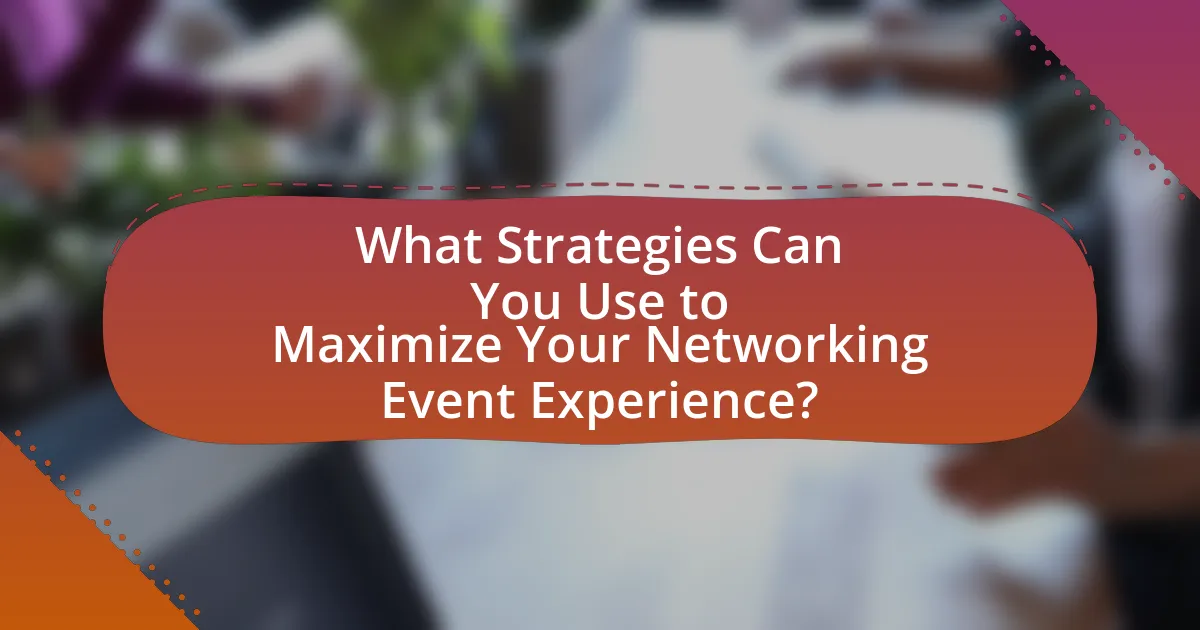
What Strategies Can You Use to Maximize Your Networking Event Experience?
To maximize your networking event experience, actively engage with attendees by preparing specific questions and topics to discuss. This approach fosters meaningful conversations and helps establish connections. Research shows that individuals who prepare in advance are more likely to make valuable contacts; for instance, a study by the Harvard Business Review indicates that networking effectiveness increases by 50% when participants come equipped with conversation starters. Additionally, following up with new contacts post-event solidifies relationships and enhances networking outcomes.
How Should You Prepare for a Networking Event in Your Trade Niche?
To prepare for a networking event in your trade niche, research the event details, identify key attendees, and develop a clear personal pitch. Researching the event allows you to understand its purpose and the audience, which is crucial for effective engagement. Identifying key attendees helps you target your networking efforts towards influential individuals or potential collaborators. Developing a personal pitch ensures you can communicate your value succinctly, making a memorable impression. According to a study by the Harvard Business Review, effective networking can lead to increased job opportunities and professional growth, highlighting the importance of thorough preparation.
What Materials Should You Bring to Networking Events?
To networking events, you should bring business cards, a notepad, and a pen. Business cards facilitate easy sharing of your contact information, which is essential for follow-ups. A notepad allows you to jot down important details about conversations and connections, enhancing your networking effectiveness. A pen is necessary for writing notes or exchanging information on the spot. These materials are standard in professional settings and help create a lasting impression while ensuring you can capture valuable insights during the event.
How Can You Develop an Effective Elevator Pitch for Networking?
To develop an effective elevator pitch for networking, clearly define your unique value proposition in a concise manner. An effective pitch should be around 30 seconds long, focusing on who you are, what you do, and what sets you apart from others in your field. For instance, stating your professional background, a specific achievement, and how you can help others can create a compelling narrative. Research indicates that a well-structured elevator pitch can increase networking success by up to 70%, as it allows for memorable and impactful introductions.
What Follow-Up Actions Should You Take After Attending Networking Events?
After attending networking events, you should promptly follow up with the contacts you made by sending personalized emails or messages. This action reinforces the connection established during the event and demonstrates your interest in maintaining the relationship. Research indicates that timely follow-ups, ideally within 24 to 48 hours, significantly increase the likelihood of a positive response, as noted in a study by the Harvard Business Review, which found that timely communication enhances relationship-building efforts. Additionally, consider connecting on professional social media platforms like LinkedIn to further solidify your network.
How Can You Maintain Connections Made at Networking Events?
To maintain connections made at networking events, follow up promptly with personalized messages to reinforce the relationship. This can include sending a thank-you email or connecting on professional platforms like LinkedIn, which has over 900 million users, facilitating ongoing communication. Regularly engage with their content, such as liking or commenting on their posts, to keep the connection active. Additionally, consider scheduling periodic check-ins or coffee meetings to discuss mutual interests or opportunities, which can strengthen the relationship over time.
What Tools Can Help You Organize and Manage Your Networking Contacts?
Tools that can help you organize and manage your networking contacts include customer relationship management (CRM) software, contact management apps, and digital note-taking tools. CRM software like Salesforce and HubSpot allows users to track interactions, manage relationships, and analyze networking efforts effectively. Contact management apps such as CamCard and Contacts+ enable users to store and categorize contact information easily. Digital note-taking tools like Evernote and Notion facilitate the organization of notes and insights from networking events, ensuring that important information is readily accessible. These tools enhance efficiency and effectiveness in managing networking contacts, ultimately supporting better relationship-building in professional settings.
What Are Some Best Practices for Networking in Your Trade Niche?
Best practices for networking in your trade niche include attending industry-specific events, actively engaging in online forums, and building relationships through follow-ups. Attending events such as trade shows or conferences allows professionals to meet key players and learn about trends, as evidenced by a 2022 survey indicating that 85% of attendees found valuable connections at such events. Engaging in online forums, like LinkedIn groups related to your niche, fosters discussions and knowledge sharing, which can lead to collaborations. Following up with contacts after initial meetings solidifies relationships; research shows that consistent follow-up increases the likelihood of collaboration by 70%.
How Can You Build Authentic Relationships Through Networking?
Building authentic relationships through networking involves engaging genuinely with others, focusing on mutual interests, and providing value. Establishing trust is crucial; this can be achieved by actively listening, showing empathy, and being transparent in interactions. Research indicates that networking is most effective when individuals prioritize quality over quantity, as authentic connections often lead to more meaningful collaborations and opportunities. For instance, a study by the Harvard Business Review found that strong professional relationships can increase job satisfaction and career advancement. Therefore, by prioritizing genuine interactions and shared goals, individuals can cultivate lasting and impactful relationships within their trade niche.
What Common Mistakes Should You Avoid When Networking?
Common mistakes to avoid when networking include failing to research attendees and their interests, which can lead to irrelevant conversations. Engaging in superficial interactions rather than building meaningful relationships is another mistake; studies show that strong connections yield better networking outcomes. Additionally, neglecting to follow up after initial meetings can result in lost opportunities, as 80% of networking success comes from maintaining relationships. Lastly, approaching networking with a purely transactional mindset can deter potential connections; focusing on mutual benefit fosters a more productive networking environment.
